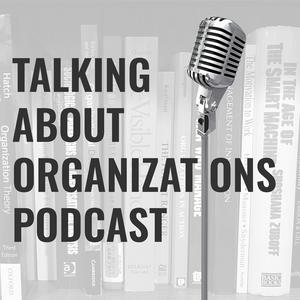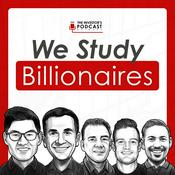343 episódios

132: AoM Special (Part 2) -- Queer Eye for Academics: Skills for Navigating Academic Life
16/12/2025 | 59min
We now release a recording of a professional development workshop (PDW) called Queer Eye For Academics: Skills For Navigating Academic Life, held at the 2025 Academy of Management annual meeting. Inspired by the popular Queer Eye television series, this PDW offered a fresh approach to skill-sharing within academia, and featured six presenters – most early-career scholars from the LGBTQ+ community -- covering a variety of practical skills such as teaching, crafting research programs, and presenting, and interpersonal development skills such as engaging, fostering caring relations, and recognizing colleagues.

132: AoM Special (Part 1) -- Multimodal Impact: Translating Academic Knowledge via Contextual, Collaborative, and Collectivist Modes
10/12/2025 | 46min
This month, we are presenting recordings of two events from the Academy of Management Annual Meeting 2025. The first event was Multimodal Impact: Translating Academic Knowledge via Contextual, Collaborative, and Collectivist Modes. This symposium brings together five presenters to explore diverse modes of translating academic expertise into practice. As management researchers increasingly strive to achieve societal impact, this event sought to understand how different communication modes can bridge the persistent research-practice divide.

131: Commitment and Community -- Rosabeth Moss Kanter (Part 2)
18/11/2025 | 45min
In Part 2 of our episode on Kanter’s Commitment and Community, we examine in depth her conclusions about the distinction between “retreat” and “service” communities and why the former tends to fail while the latter shows greater chances of long-term success. However, we also debate on the meaning of “success” as being more nuanced that merely duration of the commune over time. We then discuss the implications for this study for the present day when Internet-based social movements of all forms and perspectives can be formed readily – but how and why do they last?

131: Commitment and Community -- Rosabeth Moss Kanter (Part 1)
11/11/2025 | 43min
This month we return to the works of Rosabeth Moss Kanter, whose works on tokenism we explored way back in Episode 17. This time, we will discuss one of her better known books Commitment and Community: Commune and Utopias in Sociological Perspective that examines the origins and life cycle of numerous communes that sprang up in the US from the mid-19th century to the 1960s. Written based on her dissertation study at a time when hippie communes were popular, she wondered what drove people to start or join these communes and what factors enabled the communes’ survival. This week’s Part 1 is about her conceptual framework and study, and next week’s Part 2 will focus on the conclusions and implications for social movements today.

131: Commitment and Community -- Rosabeth Moss Kanter (summary of episode)
11/11/2025 | 4min
Coming soon! In our next episode, we will discuss Rosabeth Moss Kanter’s famous book Commitment and Community that examines the origins and life cycle of numerous communes that sprang up in the US from the mid-19th century to the 1960s. What drove people to start or join these communes? And then, what factors allowed some to survive for decades or longer while others broke up within months? The answers have added greatly to our understandings of individual commitment to an organization and an organization’s commitment to its members.
Mais podcasts de Negócios
Podcasts em tendência em Negócios
Sobre Talking About Organizations Podcast
Ouve Talking About Organizations Podcast, MoneyBar e muitos outros podcasts de todo o mundo com a aplicação radio.pt

Obtenha a aplicação gratuita radio.pt
- Guardar rádios e podcasts favoritos
- Transmissão via Wi-Fi ou Bluetooth
- Carplay & Android Audo compatìvel
- E ainda mais funções
Obtenha a aplicação gratuita radio.pt
- Guardar rádios e podcasts favoritos
- Transmissão via Wi-Fi ou Bluetooth
- Carplay & Android Audo compatìvel
- E ainda mais funções


Talking About Organizations Podcast
descarregue a aplicação,
ouça.


































